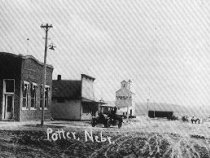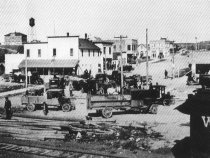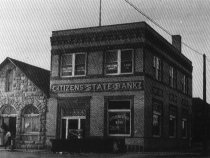Potter
Cheyenne County
Potter
Cheyenne County
Potter, in western Cheyenne county, owes its early establishment to the railroad. The station house built in 1870 was the only building for a number of years so it served as station, post office, and school, with a teacher from Omaha. First cattlemen, but gradually some settlers, staked their claims. Frank Hyde built a livery barn and dug the first well in Potter. He not only put in a tank and windmill, but piped water to some of the buildings and houses. While primitive, it was the first water system in town. Civic advancement began in earnest in 1885 when a hotel was built. Soon there was a bunch of stores, a newspaper and a Lutheran church. In the winter of 1886 the grangers to the north would bring in red cedar posts and trade for groceries. Farmers who had settled around Potter began to raise wheat and oats. 1892 was such a big crop that the town put up grain storage houses. Everything seemed bright for Potter, but the drought the next three years changed that. Many settlers left and the town suffered hard times. When the "section homestead bill" was passed, things started looking up. In 1907 a bank was organized and many other improvements were made. The town incorporated and began to put in sidewalks. A city light and water system were established. By 1915 the town had a brick schoolhouse..." with basement, gymnasium, domestic science and clay molding." The "Potter Review" called it "the biggest little city in Nebraska," because of the number of business houses it sported. In the 1920s the town had several civic improvements: a public library, a community dump, and a power plant with a second generating unit. When the Lincoln Highway was built in 1929, the route through town on Front Street was changed to a by-pass on the south side of the tracks. No body wanted all that noise and traffic in town. During the Depression many businesses operated on customer credit. While this was a great humanitarian gesture, not all survived. The city approved a volunteer fire department, had an annual city clean-up, and sold electric power to Dix. A softball association was formed in 1934. The city helped by putting lights in the city park, but shut them off at 10:30 whether the game was over or not. During those days, entertainment of any kind was greatly appreciated. The town band led by Dale Chambers played summer concerts in the bandshell. A packed house was a certainty when the Chick Boyes players came to Seyfang Hall, or a traveling Chautauqua tent show came to town. Civic pride was shown by the organization of Potter Days in 1936, where the first prize in the drawing was a brand new Chevrolet, won by Joe Frei. The tradition of Potter Days has continued ever since, with parades, drawings, contests, exhibits, and dances. Economic recovery in the 1940s was evidenced by the city buying 30 acres for an airport. The Potter Co-op built a new elevator and the town was busy every Saturday night. The coming of REA electricity in the late '40s brought the greatest change, with farmers wanting appliances of all kinds, tools for their shops, etc. As the years rolled by, Potter built a youth center, installed new lights, a city-wide sewer system, street signs, and paved the business district. In 1974 the business district was greatly improved by the beautiful new bank building. Potter has progressed over the years, with slowdowns during the periods of hard times on the farm, and great spurts of improvements during the good times. The town is still holding strong with a population of 350 as compared to over 500 in the 1950s. The rural population has dropped by a larger percentage. The town has about 30 businesses, two churches and many organizations. Faith in the future is evident with several new and expanding facilities. A momentous change was accomplished in 1987 with the consolidation of the Potter and Dix school districts. Great pride is being shown in the immediate successes of the students in athletics, speech and drama, and scholarships. This coming together of the schools will assure both towns of quality education, with local control and pride, for many years to come. By Doug Reetz, HC 84-66, Buffalo Bend, Potter, NE 69156 |
 Potter, Nebraska, 1915, main
street.
 Garage about 1914. Note Lincoln Highway sign on left corner of building.  Potter from other side of
the tracks, 1918.
 The new Potter State Bank  Citizens' State Bank. 1918. Stone building on the left is Potter Museum. |